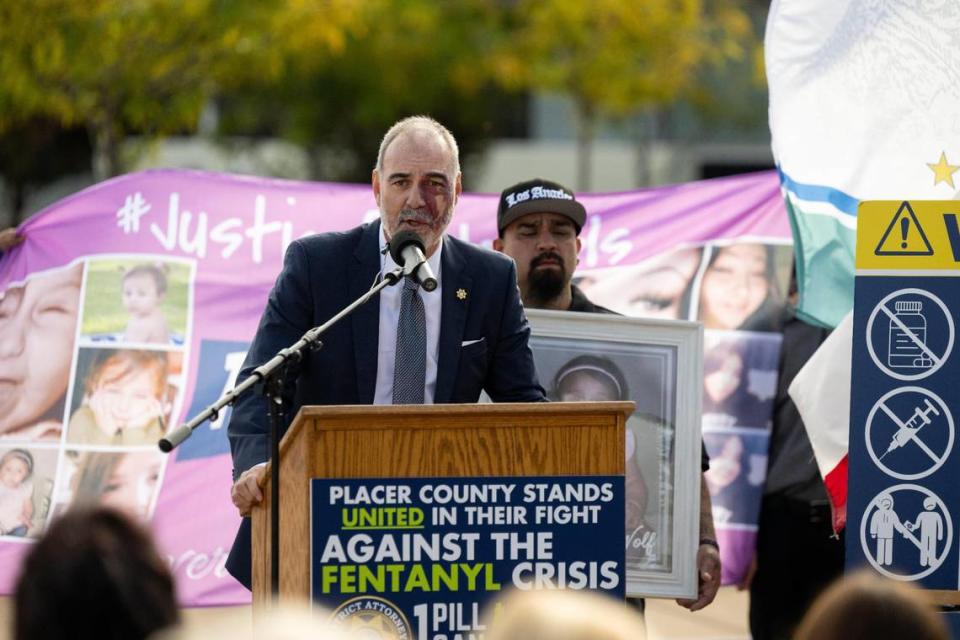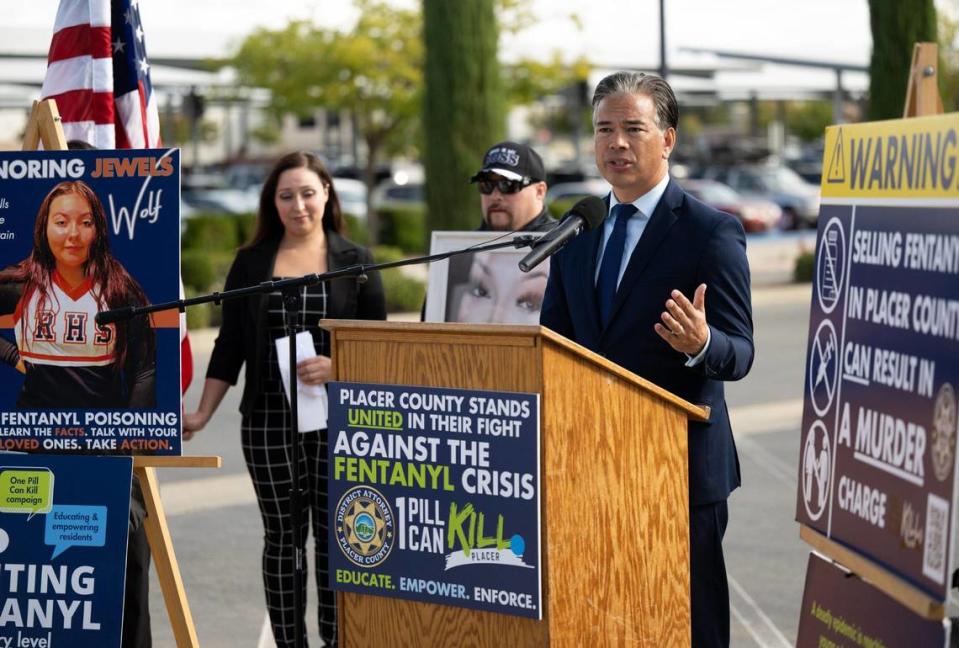‘This is not an honor we wanted’: Placer case was first California fentanyl murder conviction
Placer County District Attorney Morgan Gire, along with local and state officials, gathered for a news conference Tuesday shortly after Nathaniel Evan Cabacungan was sentenced to prison as the first person in California to be convicted of a murder charge in a fentanyl death.
Nathaniel Evan Cabacungan, 22, pleaded guilty in July to second-degree murder for the death of 15-year-old Jewels Marie Wolf, a Roseville teen who died in June 2022 after ingesting a fake Percocet pill containing a lethal dose of the synthetic opioid. Cabacungan also pleaded guilty to solicitation of a minor to use or sell a narcotic as part of a plea agreement with the District Attorney’s Office.
Gire said at Tuesday’s news conference that the gathering was not a celebration but a reflection and recognition of what they are doing in Placer County to help protect people from deadly fentanyl.
“This is not an honor we wanted, nor one that Jewels’ family deserved,” Gire said about the state’s first-ever murder conviction in a fentanyl death. “I think for those of you that witnessed in court the impact statements of Jewels’ parents and loved ones, we truly saw the strength of the human spirit today.”

Cabacungan on Tuesday was formally sentenced to 15 years to life in prison as part of the plea deal. Deputy District Attorney Daniel Wesp, in filed court documents, has said Cabacungan gave the teen girl the pill with fentanyl, left her alone dying in her bed without calling for help and was selling the deadly pills to someone else later that same night.
“He had the opportunity to intervene. He had the opportunity to save her life, and he chose to watch her die instead,” Gire said of Cabacungan.
Fentanyl, primarily made in foreign clandestine labs and smuggled into the United States, is increasingly being pressed into pills made to look like legitimate prescription opioid tablets. They often contain lethal doses, Wesp had said. The prosecutor has said in court that Cabacungan used social media, specifically Snapchat and Instagram, “to advertise his deadly fentanyl for sale.”
Gire said Cabacungan’s conviction and prison sentence demonstrate they can hold fentanyl dealers accountable, “those who knowingly sell poison in our communities.” The district attorney said county officials have hit the fentanyl crisis with a combined approach, including spreading awareness of the deadly drug, aggressive enforcement and prosecution.
“Let me be clear: For those that come into our county and knowingly sell their poison, we will come after you,” Gire said.
“We will prosecute you, and we will do our best to separate you from society for as long as we possibly can.”
He said the real strength behind the combined effort has come from the grieving families of those killed by fentanyl. Those families have spoken out as part of Placer County’s “1 Pill Can Kill” educational campaign.
“I am so thankful for their participation, their dignity and grace, and the manner in which they have carried themselves through this process,” Gire told reporters. “It is something that no parent and no family member, no best friend deserves or wants, but they have done their best.”
California Attorney General Rob Bonta also spoke at Tuesday’s conference. He said he hopes that the conclusion of Cabacungan’s criminal case provides Jewels’ parents a sense of relief, even after facing a parent’s worst fear of losing a child.

“This historic sentencing, again not something that we wanted to happen here, but it is historic,” Bonta said. “And to me, it’s an example of good law enforcement at its finest, working together, following the facts, building the case.”
Bonta told reporters that they are witnessing throughout the nation a devastating rise in young people dying from fentanyl overdoses. He said he can’t stress enough how dangerous fentanyl is: “It’s cheap, it’s potent and it’s lethal.”
Placer County Sheriff Wayne Woo said the investigation that led to Cabacungan’s arrest and later his conviction was spearheaded by sheriff’s Detective Patrick Craven and the Placer County Special Investigations Unit. The team is made up of investigators from other local law enforcement agencies and led by the state Department of Justice.
“When this case came forward, it was clear it was going to require a lot of resources to gather the evidence needed to get Jewels justice,” the sheriff told reporters. “Nobody hesitated. Every agency was 100% on board.”
Editor’s note
In a departure from common county court practice, Placer Superior Court Judge Angus Saint-Evans on Tuesday denied professional media photographers, including The Sacramento Bee’s Paul Kitagaki Jr. who was present in the courthouse with a previously signed court order granting him access to photograph in the courtroom, the opportunity to photograph the sentencing of Nathanial Cabacungan for the first fentanyl murder sentencing in California.
Instead of creating a media pool, the judge directed news organizations to rely on handout photographs produced by a government employee. The Bee, joined by the Associated Press, declines to reproduce these images because they represent a chilling restriction on the function of a free and independent media.

